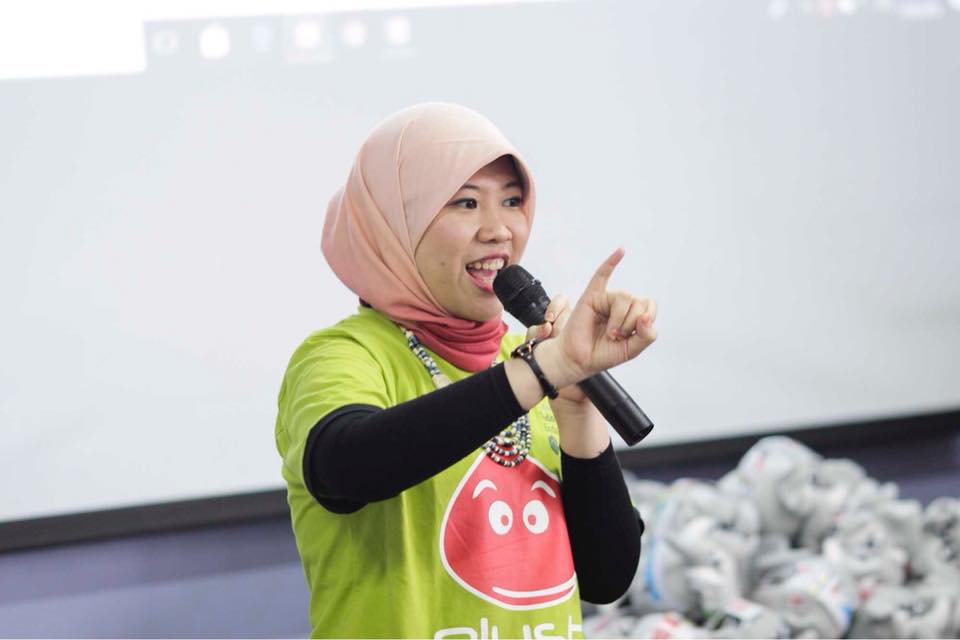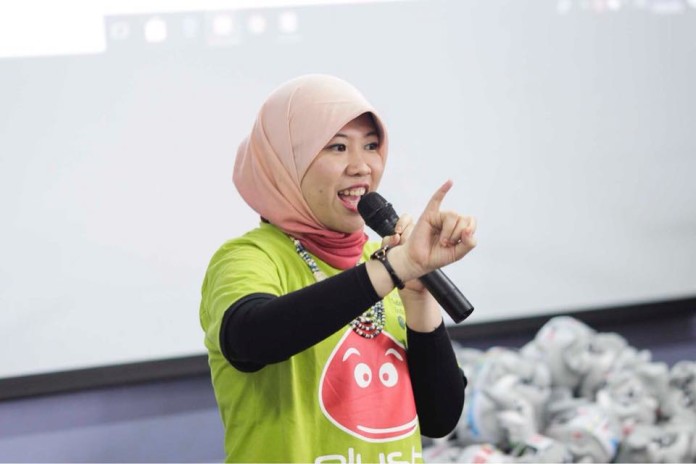Editor’s note: To celebrate our anniversary, Indonesia Mengglobal is drawing inspiration from all individuals who once lived abroad and came back to motherland to help build Indonesia, through the theme “Indonesia Matters: Global Impacts from Within”. A mutual friend referred me to Dissa Ahdanisa, a wise and inspiring woman juggling motherhood, PhD studies and social entrepreneurship and I immediately knew she embodies our theme very well. Dissa is most famously known as the founder of Deaf Cafe Fingertalk, which empowers the deaf community from rural Indonesia through better livelihood. Dissa is also a PhD candidate of Graduate School of Asia Pacific Studies in Ritsumeikan APU, Japan. Fresh after Fingertalk’s participation in Hult Prize Japan 2019 Tokyo Regional Summits, one of the world’s biggest platform to pitch grassroot solutions for social issues, I had the pleasure to interview Dissa. It’s a great conversation about how passion for foreign languages and education turns into social entrepreneurship, so I hope you enjoy it! (All photos are from Fingertalk’s public Facebook albums.)

English, Spanish, Japanese, and Sign Language
Dissa strikes me as someone with huge passion meets the right opportunity. At the start of what would then become a lifelong journey in education and foreign languages, a 10-years old Dissa met a deaf individual for the first time in a nursing home for elderlies. Instead of speaking, an elderly man took her hand and taught her how to spell her name in sign languages. The encounter left a deep impression for her, but it took years and a job in a small NGO in Nicaragua for Dissa to finally see a living example of how deaf and hearing communities work hand-in-hand. Shortly after walking into Café de las Sonrisas (“Smiles Cafe”), run by a Spanish chef who employed deaf people to staff the cafe. There was a clear message written for everyone to read, “This is not a charity, your money goes to our employees’ salary.” This encounter was a turning point for her and her idea to start Fingertalk, and to this date the Spanish chef she met in Nicaragua still acts as a mentor and advisor to her.
I’ve read this story before the interview and wondered if from here on, everything was smooth sailing. I decided to ask Dissa to walk us through how she translated her vision to reality.
Dissa stressed that the small act of knowing somewhere in the world her vision already exists, goes a long way. She took the first step to tell someone else about her idea, her mom. She told me that her philanthropic mom is an auditor by day and runs a school for underprivileged people by night. Yet, her mom drilled her on the question of “How are you going to do it?” It was 2013 and social entrepreneurship wasn’t a buzzword back then. There was no startup incubator, no accelerator, not even family relatives who could invest the capital. Dissa said her mom opened her school by herself, so she too decided to start using her own money and to this date, Fingertalk remains bootstrapped.
She then took a job in Credit Suisse’s Singapore office and realized that her higher disposable income could be used to start Fingertalk. She also started learning Singaporean Sign Language (SgSL) after work. The community referred her to the deaf community in Indonesia through her university junior who wrote about sign language for Jakarta Post. One meeting led to another, until she eventually met Ibu Pat Sulistyowati, the Head of Gerakan untuk Kesejahteraan Tunarungu Indonesia (Gerkatin). While sharing a cab home, Ibu Pat asked Dissa to check out one of an empty space in her house if it could be used as the first Fingertalk location, which turned out to be perfect after renovation. Ibu Pat also spoke on Dissa’s behalf and broadcasted Fingertalk to the entire deaf community in Indonesia, helping her to hire staff and find customers. Suddenly everything she thought she would create one day was right in front of her eyes. With the support from her mom and Ibu Pat Sulistyowati, a free location, a stable career and the willingness to split her life half in both Singapore and Indonesia for the years to come, Dissa finally opened Fingertalk Cafe’s first location in May 2015.
Putting the ‘social’ in social entrepreneurship

Despite the success which led to the amount of media coverage Fingertalk has generated, Dissa has never forgotten the struggles and challenges she faced, sometimes from the very community she is trying to help. She understands that within the deaf community, there’s always a fear of being judged and bullied by the hearing community. It makes Ibu Pat’s endorsement of Fingertalk crucial to humanize her approach. DIssa told me of a now-defunct establishment run by a group of deaf individuals in Jogjakarta, which apparently failed because it exclusively catered to deaf community. “I don’t want Fingertalk to be like that. Being a hearing person I realized that I have hearing friends who also want to share a meal and learn sign language. That’s how we started”
Fresh off the year-long journey to Hult Prize, Dissa was very keen to explore the future plan for Fingertalk. It started as a cafe but understanding the potential of the deaf community, especially in arts and crafts, Fingertalk pitched the idea of training their deaf staffs with the skills to create plush toys. She realized that Fingertalk has to be able to solve the core issue with the deaf community, that even the most well-intentioned training program doesn’t guarantee the availability of job opportunities for deaf people.
“Back then we received US Embassy grant to create an employment training in Fingertalk’s Central Sulawesi branch. But even after the training, Poso is still not a place where the deaf community could easily be afforded job opportunities. The same thing happened in another branch, after a bakery training I was approached by our deaf friends who thought that they could immediately start working for Fingertalk. I had to manage all these expectations well. The reality is that the supply of people without jobs is way higher than what the market could offer. Therefore, by creating our own products, we are making our own opportunities.”
Splitting life in Singapore, Indonesia and Japan
By the time our conversation entered this topic I had already known that Dissa is very committed to her vision. But to juggle 2 years of life in between Singapore and Indonesia before moving back home, while simultaneously working on two demanding careers, is another thing.
“I think it was the time we were about to open our second branch. I realized it was getting bigger, yet I couldn’t commit 100% of my time. Yes I know that I was relying on my salary to support Fingertalk financially but if I hadn’t left Singapore, my safety net would’ve eventually held me back. I had to make a choice.”
Dissa recognized that the biggest payoff of her decision to go back to Indonesia is that publicity immediately went in her favor, now she could spend more time on the ground and educate people about Fingertalk. But she also recognized the pitfall of her growing publicity, that if Fingertalk kept basking in the admiration of the media, they would spend more time citing their media exposure than generating real jobs for the deaf community. Dissa also realized that since her academic background was nowhere related to disability rights–Bachelor degree in Accounting and Master’s degree in Accounting and Finance, she is now doing her PhD in disability rights in Ritsumeikan APU in Beppu, Japan.
“Scholars and the people in the academic community are very helpful to me. That’s why we also decided to join Hult Prize, not only for the prize but for the learning opportunities along the way. The city I live now, Beppu, for instance is a very disability-friendly city. They have hosted wheelchair marathon since 1975. I decided to be in Japan now for opportunity to learn about Fingertalk’s future growth.”
Find out more about Deaf Cafe Fingertalk here.








